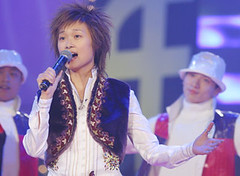Mongolian Cow Sour Yogurt Supergirl

Supergirl!
Originally uploaded by
Other Lisa.
The Mongolian Cow Dairy, the third biggest dairy in China, wanted to sell more sour yogurt. That's how it all started. To move that yogurt they needed advertising. To deliver that advertising to Chinese eyes, they needed a vehicle that Chinese would welcome into their homes. Most of Chinese TV is pretty bland fare, featuring military officers singing patriotic anthems. One of the most watched shows every year on the national broadcaster, China Central TV, is the "Spring Festival Evening Party," a sort of Chinese version of the Lawrence Welk show showcasing variety acts with patriotic themes.
Renegade Hunan Satellite TV developed a Chinese knock off of "American Idol," where females from four to 89 were encouraged to sing for stardom. The prize was $6000, a princely sum in China amounting to five years of the average wage. About 120,000 girls auditioned for the talent competition. The finalists were picked by a few judges from the entertainment industry and thirty-one judges from the "laobaixing," the common people. The winner, the Supergirl, was chosen by the viewing audience, who paid an extra fee to vote by cell phone. Thus was born the Mongolian Cow Sour Yogurt Supergirl Contest.
It was a runaway hit. The audience accumulated as the show moved through the country, choosing regional finalists. The final show picking the national winner drew 200 million viewers. Some 271,000 viewers voted by cell phone to pick Li Yuchun, 21, a student from the Sichuan province. Hunan TV raked in the money, $12 million from the Mongolian Cow Dairy and fifteen grand from advertisers for every fifteen second spot. The Mongolian Cow Dairy became the biggest dairy in China during the show's run.
The Communists in charge of China were not amused. First, Western influence, especially American influence, is not welcome in Red China, despite its recent forays into the capitalist market system. One of the creators of the Supergirl contest, Liao Ke, denied knowledge of the "American Idol" program. He just happenned to dream up a duplicate of it. Nevertheless, the Ministry of Culture has decided to issue no more licenses to foreign satellite TV broadcasters and reign in the thirty-one existing ones "to safeguard national cultural safety."
The state didn't like the way the way the show's hostess, Li Xiang, talked. Instead of the officially approved soft beauty favored by China Central TV, Li Xiang is an edgy pop music hostess who uses Hong Kong and Taiwanese slang in her onstage patter. Such slang, born where speech is freer, comes across as hip and fresh to mainland Chinese kids. Chinese leaders don't like that at all: "Hosts and hostesses represent the image of radio and TV stations and therefore have an unshakeable responsibility to spread advanced culture and national virtue and to safeguard the country's interests." Consequently, the State Administration of Radio, Film and Television has decreed that masters of ceremony must use standard formal Mandarin Chinese. No more Hong Kong nor Taiwanese slang nor accents.
"We are having a lot of discussions on anti-worldliness. We always stand against the programs of low taste and worldliness," said an official from the State Administration of Radio, Film, and Television. The Supergirl finalists portrayed themselves as various sex object stereotypes: tomboy, pouty schoolgirl, baby doll, and glamour queen. They sang raunchy rock songs. They craved fame. The government pressure toward the end of the series was enough to force the show to abandon pop songs in the final show in favor of more traditional folk and opera songs, like "Love Our China."
And there was the matter of voting for the winner. Some commentators, noting the enthusiasm for voting, ventured that people might want to pick their leaders like that some day.
The capitalist genie is out of the bottle in Red China and can not be put back. China is slowly turning to capitalism, to free markets, and embracing free speech by degrees. These things will be delivered not by foreign armies forcing change on China but rather by the Mongolian Cow Sour Yogurt Supergirl, who is a human wrecking ball to the old Chinese Communist system.

4 Comments:
This is good. China and capitalism. That has a calming effect on me!
Nice writing. Except "Most of Chinese TV is pretty bland fare, featuring military officers singing patriotic anthems." was way out of date(more than 20 years old ). The supergirl is coming out on Time magazine.
Maoxianjia,
Thanks for the comment. I have to rely on secondary sources for what's on Chinese TV. When I lived in the Philippines twenty years ago, most of the local TV was Philippino girls lip-synching to American pop music, over and over again, in different places.
So what do Chinese viewers see on their TVs?
Tantor
Chinese viewers see on TV the same vapid stuff most others see on TV around the world. Their own soap operas, game shows, talk shows, news, cooking shows, kids programming. They do have a propensity for romantic shows based in pre-communist China that may or may not involve fantastic displays of wire tricks. Western shows dubbed in Chinese are also popular.
Capitalism in China is raging, the leaders eased restrictions after Tiananmen Square to give youth a distraction against democracy -- it's working. There's a Starbucks inside the Forbidden City after all -- INSIDE.
Post a Comment
<< Home